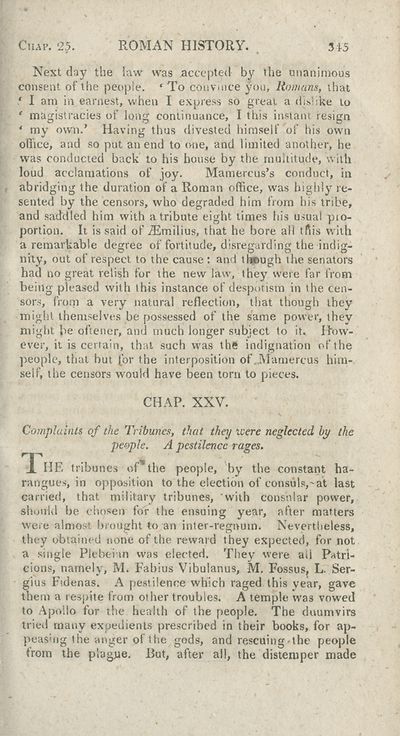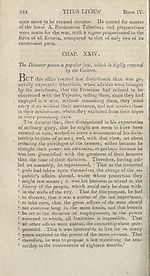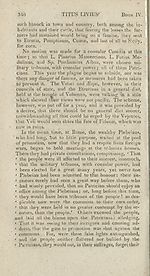Download files
Complete book:
Individual page:
Thumbnail gallery: Grid view | List view

I' Chap. 25. ROMAN HISTORY. 315
Next day the law was accepted the unanimous
f consent of the people. ‘ To convince you. Rowans, that
I am in earnest, when I express so great a dislike to
‘ magistracies of long continuance, I this instant resign
p * my own.’ Having thus divested himself of his own
office, and so put an end to one, and limited another, he
, was conducted back to his house by the multitude, with
loud acclamations of joy. Mamercus’s conduct, in
, abridging the duration of a Roman office, was highly re-
sented by the censors, who degraded him from his tribe,
and saddled him with a tribute eight times his usual pio-
portion. It is said of Aimilius, that he bore all tflis with
a remarkable degree of fortitude, disregarding the indig¬
nity, out of respect to the cause : and thattugh the senators
had no great relish for the new law, they were far from
being pleased with this instance of despotism in the cen¬
sors, from a very natural reflection, that though they
might themselves be possessed of the same power, they
t. might be oftener, and much longer subject to it. How¬
ever, it is certain, that such was th* indignation of the
people, that but for the interposition of .Mamercus him¬
self, the censors would have been torn to pieces.
CHAP. XXV.
Complaints of the Tribunes, that they were neglected by the
people. A pestilence rages.
THE tribunes of*the people, by the constant ha¬
rangues, in opposition to the election of consuls,-at last
carried, that military tribunes, with consular power,
should be chosen for the ensuing year, after matters
| were almost, brought to an inter-regnum. Nevertheless,
they obtained none of the reward they expected, for not
a single Plebeian was elected. They were ail Patri-
cions, namely, M. Fabius Vibulanus, M. Fossus? L. Ser¬
gius Fidenas. A pestilence which raged this year, gave
them a respite from other troubles. A temple was vowed
to Apollo for the health of the people. The duumvirs
tried many expedients prescribed in their books, for ap¬
peasing the anger of the gods, and rescuing-the people
from the plague. Rut, after all, the distemper made
Next day the law was accepted the unanimous
f consent of the people. ‘ To convince you. Rowans, that
I am in earnest, when I express so great a dislike to
‘ magistracies of long continuance, I this instant resign
p * my own.’ Having thus divested himself of his own
office, and so put an end to one, and limited another, he
, was conducted back to his house by the multitude, with
loud acclamations of joy. Mamercus’s conduct, in
, abridging the duration of a Roman office, was highly re-
sented by the censors, who degraded him from his tribe,
and saddled him with a tribute eight times his usual pio-
portion. It is said of Aimilius, that he bore all tflis with
a remarkable degree of fortitude, disregarding the indig¬
nity, out of respect to the cause : and thattugh the senators
had no great relish for the new law, they were far from
being pleased with this instance of despotism in the cen¬
sors, from a very natural reflection, that though they
might themselves be possessed of the same power, they
t. might be oftener, and much longer subject to it. How¬
ever, it is certain, that such was th* indignation of the
people, that but for the interposition of .Mamercus him¬
self, the censors would have been torn to pieces.
CHAP. XXV.
Complaints of the Tribunes, that they were neglected by the
people. A pestilence rages.
THE tribunes of*the people, by the constant ha¬
rangues, in opposition to the election of consuls,-at last
carried, that military tribunes, with consular power,
should be chosen for the ensuing year, after matters
| were almost, brought to an inter-regnum. Nevertheless,
they obtained none of the reward they expected, for not
a single Plebeian was elected. They were ail Patri-
cions, namely, M. Fabius Vibulanus, M. Fossus? L. Ser¬
gius Fidenas. A pestilence which raged this year, gave
them a respite from other troubles. A temple was vowed
to Apollo for the health of the people. The duumvirs
tried many expedients prescribed in their books, for ap¬
peasing the anger of the gods, and rescuing-the people
from the plague. Rut, after all, the distemper made
Set display mode to:
![]() Universal Viewer |
Universal Viewer | ![]() Mirador |
Large image | Transcription
Mirador |
Large image | Transcription
| Antiquarian books of Scotland > Curiosities & wonders > Titus Livius' Roman history > (349) |
|---|
| Permanent URL | https://digital.nls.uk/115987337 |
|---|
| Description | Thousands of printed books from the Antiquarian Books of Scotland collection which dates from 1641 to the 1980s. The collection consists of 14,800 books which were published in Scotland or have a Scottish connection, e.g. through the author, printer or owner. Subjects covered include sport, education, diseases, adventure, occupations, Jacobites, politics and religion. Among the 29 languages represented are English, Gaelic, Italian, French, Russian and Swedish. |
|---|

